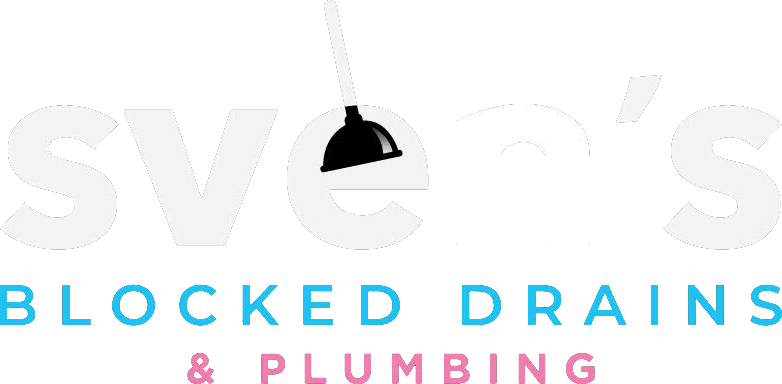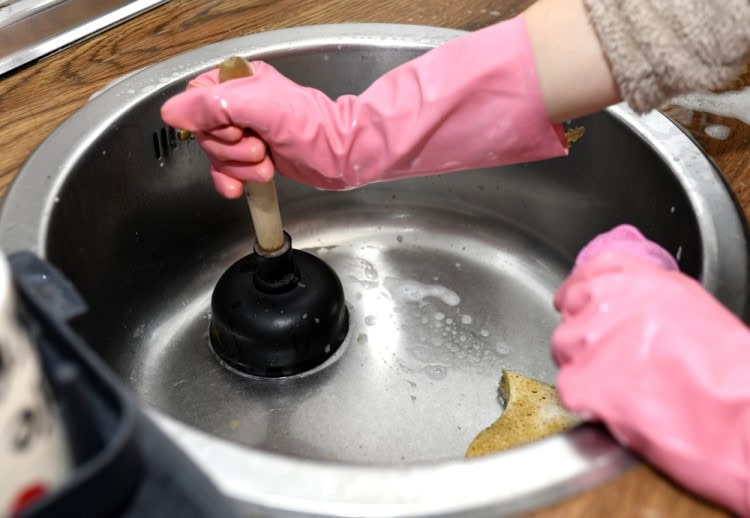You use your drains every day at home, so keeping them in good health is important if you want to be able to eat, clean and wash without a second thought. When your drains start to act up, it’s important that you take the right actions to avoid making the problem worse.
There are plenty of different ways to tackle your drainage problems, with some actually making the problem worse! With all this in mind, we’ve listed some of the most important ones to avoid, so please resist the urge to do any of these when attempting to fix a drainage problem.
Common Drainage Problems
Here are some of the most common problems that can occur with your property’s drains and pipes.
- Clogged Drains: One of the most common drainage issues you’ll experience is a clog in your drainage system. These clogs, whether from grease, hair or food, can slow or even fully block the flow of water down your drainage pipes, causing dirty water to flood back up and into your home. Signs of a clogged drain include nasty smells, gurgling sounds from your pipes, slow-draining water, and the eventual refusal of water to drain away through your pipes.
- Leaky Pipes: Old pipes (or ones that have been clogged and cracked open) can start to leak water, which may cause severe damage to your home if left alone. Whether it’s a slow drip or a consistent gush of water, leaky pipes are some of the most dangerous for your home! Water can damage the structure of your property, as well as encourage mould growth and even invite insects and rodents to make your home their own.
- Dirty Water: If the water coming out of your kitchen sink or bathroom basin isn’t clear, it’s usually cause for concern. Dirty water can be caused by old, rusted pipes, a damaged drainage system, or even an issue with your hot water heater. Sometimes, it may mean necessary work is being done to the system in your area, but usually your council will let you know about this ahead of time.
- Bad-Tasting Water: If you notice an off taste to your water, it may be a sign that you have an issue with your hot water system or wider pipes. Tastes like chlorine can be normal, but if your water tastes metallic or dirty (even though it looks clean), then you’ll need to find the source of the problem quickly before the water becomes undrinkable.
These are just some of the problems you may face with your drainage system. When you come across them, don’t panic! You can always call a professional plumber to come and assess the situation.
Here are some of the things you should never do:
Don’t Leave The Water On
If you have a suspected leak, you may like to leave your water on and tap running to try and find the source. However, this can cause more damage than good in the long run. Leaving your water on while you have a leak can lead to the problem becoming worse, as well as cause more damage to your home over time.
A pipe that is allowed to leak can cause excess water to pool in your home, damaging your floor and walls in the process. Not only that, but a persistent leak can cause your water bill to increase too.
The first thing to do when you have a plumbing problem is to turn off the water. And we don’t just mean the tap–shut off your water main to stop the water supply to your property. If you have a leaking tap or your water supply has been contaminated, this is especially important, as it will prevent the problem from getting worse and potentially damaging your home.
Avoid The Crazy Chemicals
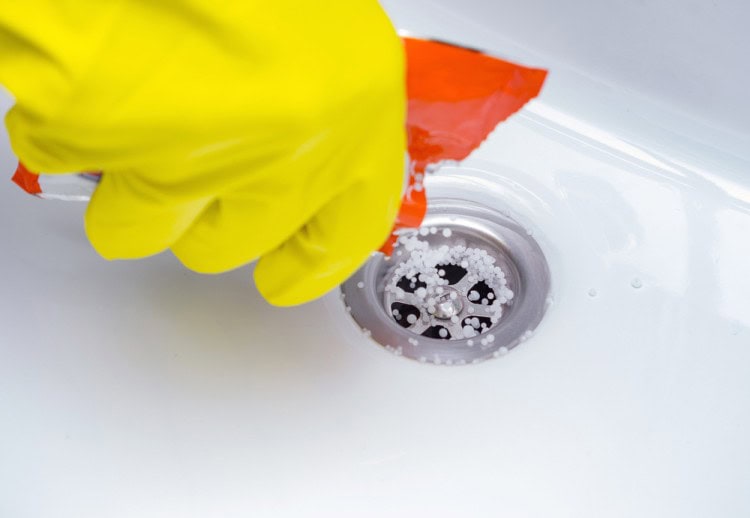
If you have a clogged drain to deal with, you may come across various drain cleaning solutions for sale that you can pour down your drain to ‘clear’ the blockage. These chemical drain cleaners will promise they can burn through the clog, no matter if it’s made from fatty oils, hair or food, which may sound too good to be true! Unfortunately, that’s because it usually is.
Powerful drain cleaning chemicals certainly can eat through certain types of blockages, but they are a short-term solution that won’t address the wider problem–and may cause more drainage issues for your plumbing system down the track. The harsh chemicals in these cleaners are not only bad for your health and the environment, should they come into contact, but they can also damage and weaken your pipe system.
These chemical cleaners can also linger in your system after use, which can be very dangerous if they come into contact with a different solution later on (such as bleach), causing nasty fumes to emanate from your drains.
Instead of going for an over-the-counter chemical solution, stick to your trusty plunger or invest in a drain snake to clear your drain blockages. These physical methods of clearing blocked plumbing pipes are much safer to use for all involved, and less expensive too!
Using The Wrong Type Of Plunger
Plungers are a common sight in every household, and for a good reason–they’re an effective way to clear blockages in most pipe systems. However, did you know that there is more than one type of plunger? There are three that you will see around:
- Cup plunger: This is the most common plunger type and features the classic design of a straight handle and rounded half-circle cap. These are best used on drains with flat surfaces, like your kitchen sink or bathroom sink if applicable. This is because the cup can only form a tight seal, and give you the necessary vacuum power, on a flat surface.
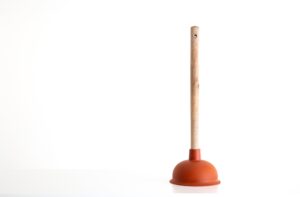
- Flange plunger: This type of plunger is also known as a toilet plunger, as it is primarily used to clear blockages in toilets. It has a similar shape to a cup plunger but it has an extra flap inside the cup that helps it create the necessary suction around the toilet’s pipe.
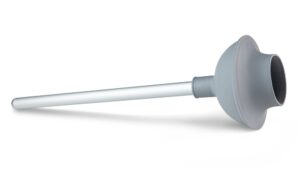
- Accordion plunger: With its unique shape, it’s easy to see where this plunger got its name from. The accordion plunger is also ideal for use in toilets, and while it may be a little tricky to get used to using compared to the others, it is extremely powerful and perfect for clearing severely blocked toilets.
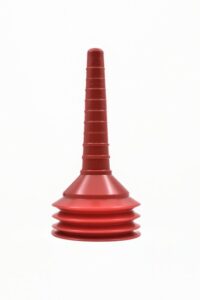
If you try to use the wrong type of plunger–say, a cup plunger in your toilet–then you won’t see effective results, as the plunger won’t be able to form a strong seal over the drain.
It’s best to have two plungers in the home – one for the toilet and another for your sinks. An accordion plunger and a cup plunger, or an accordion plunger and a flange plunger, are both good to keep around at all times.
Do you need a drainage plumber in Balwyn, Burwood or Glen Waverley? Sven’s Blocked Drains & Plumbing specialises in all things drainage, and serves all of Melbourne’s inner and outer east.
Sticking Things Down The Drain
If you look down your drain, and you can just see the clog–surely you can dislodge it? Or maybe you’re certain that clog is hiding just behind your s-bend. With a drain snake (also called a drain auger), you could certainly attempt to unclog these yourself. But if you don’t have a drain snake, you may be tempted to try using something else to clear that nasty clog.
You may think you could maybe use a long knife, a coat hanger, a screwdriver or a chopstick to unclog your drain, but it’s in everyone’s best interests to ignore this urge. Not only will using a random piece of cutlery from your kitchen not be enough to unclog your drain, but chances are it will actually do more damage to your drain pipes. A knife or coat hanger can scratch and even pierce your plumbing pipes, causing more damage and leading to a costly repair.
If you drop either of these down your sink in the process, you’ll definitely need to call in the professionals—who you’ll then have to warn that you may have made their job a little harder by adding extra things to the clog!
Trying To Save Money By Not Calling A Pro
The biggest mistake you can make is trying to solve a drainage problem that is out of your realm of knowledge or experience. Clearing a minor clog can be done by anyone with the right tools, but drainage issues like leaks, discoloured water and major blockages are always best left to the plumbing professionals. Attempting a DIY solution may end up making the issue worse–or even create a few new ones.
Make sure your drainage problems are handled correctly the first time by calling a plumber when you notice the early signs. A professional plumber will be able to diagnose the problem, discover the source and then either recommend or implement an effective solution.
Depending on the issue, they might even have a few tips to help prevent it from occurring again in the future!
Whether you’re dealing with a blocked drains in Kew, Camberwell, or Hawthorn, reaching out to a qualified plumber can save you time and hassle.
The Professionals At Sven’s Blocked Drains Make It Easy
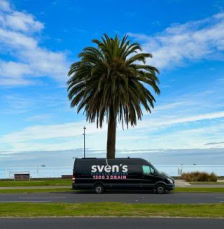
The next time you have drain problems, avoid making common mistakes and call the professionals at Sven’s Blocked Drains & Plumbing. Our team is experienced in both general repairs and as an emergency blocked drain service in Melbourne, and we are ready to assist you at all times.
Contact us at 1300 3 DRAIN (37246) or tell us about your problem online and we’ll get back to you with a solution. No matter if you have concerns about your water or need a blocked drainage plumber in Melbourne, we can provide effective and friendly service to fix all your plumbing problems!
